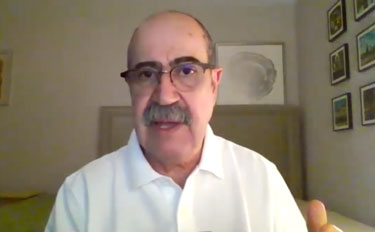This article is the sixth in the 2021 Fresh Perspectives series, presented by the de Beaumont Foundation. Published to coincide with APHA’s 2021 Annual Meeting and Expo, the series showcases viewpoints from a range of public health professionals around social connectedness.
APHA President José Ramón Fernández-Peña, MD, MPA, is director of health professions advising at Northwestern University, where he leads the university's work to support students interested in pursuing careers in the health sector. In this Q&A, Fernández-Peña reflects on what he has learned about himself and public health during the COVID-19 pandemic and shares support for public health professionals.
What are your thoughts on your past two years in public health, which includes your term as APHA president?
If I look back, two years ago, just around this time, I'm running for APHA president. I started about a year before I began my current job at Northwestern, so I'm full of ideas and I'm full of possibility.
I’m full of excitement about what this platform as president of APHA is going to enable me to do, the audiences I'm going to be able to reach, the parts of the country I'm going to be able to visit and the message that I'm going to be bringing. Also the fact that I'm just the fifth Latino president of APHA, I’m an immigrant, I’m a gay man and I’m going to go to areas where I’m not usually seen. So this is part of the excitement and the possibilities that are going to come along with me. Of course, life is like a roller coaster and the roller coaster took us down a very deep dive.
What have you learned about yourself during the pandemic?
There was, I discovered in myself, the flexibility I didn’t think I’d have. This is what's before us now, what do we do then? So how do you reconfigure your plans? How do you need to be flexible? How do you learn new technologies or new techniques, or how do you shift your messages to make them more clear, or more relevant to the time that we’re living in?
I’ve been talking about experiences that I have accrued through my second pandemic and comparing these to my experiences living through my first pandemic, which was the HIV pandemic. I’ve been developing an even more profound understanding of what these structural inequities mean, and an even deeper look at where these structural inequities come from — a better understanding of the role of racist, homophobic and xenophobic practices that keep putting certain populations always at higher risk than others.
And then the ability to question where we invest our money. Who’s driving what? For example, more recently I began to understand the role of all these so-called natural health companies and industries behind the massive flow of misinformation and really understanding that somebody benefits from these kinds of things. At the end of the day, it's about where the buck really stops and the vested interests that are out there pushing the political agenda, the social agenda, and understanding our role in fighting those negative forces that continue to sustain the structures that foster all these health inequities.
Having lived through two public health crises, HIV and COVID-19, what are the lessons learned for readiness?
I wish I had the perfect answer for that, but I can say that almost two years ago, I was speaking with a former colleague of mine, and she was also very active during the AIDS pandemic. Without being able to name it, it was the déjà vu scenario. Why does this feel so familiar? Why do I think I’ve been through this before? Is this what happened? I’m beginning to pull the threads together and saying, yeah, this is what happened. These are almost the same steps that led to a critical moment when it was really perhaps too late to take effective prevention practices: those delays, those intentional pieces of disdain, of disregard. It’s just kind of horrifying to see the parallels between these two things.
The biggest lesson at this point is...we have to develop some kind of infrastructure that will allow us to respond immediately, in real time to all the attacks on science, on public health professionals and on accurate, evidence-based information.
What is your message to public health professionals who are facing these challenges?
First, I want to thank public health people for the heroic work that they have done on top of everything else they deal with. Jumping to try to put out these fires has been a labor of love and a labor of sacrifice in so many cases. So, I would want to make sure that everybody has time to replenish and to regather their energy to lick their wounds and prepare for what may come ahead.
I would want them to know that we are an enormous family, and that hopefully we can depend on each other and know that we have each other's back. All these public health leaders that have been verbally, psychologically and physically attacked across the country, people receiving death threats for doing their job. I hope everybody can find some comfort in knowing that we are a very large community of very dedicated individuals and groups and entities and we're always there for each other.
Make plans to join Fernández-Peña and other public health leaders during APHA 2021 session 4198, “Lessons Learned: How We Can Better Respond to the Next Pandemic” at 4 p.m. MT on Tuesday, Oct. 26.